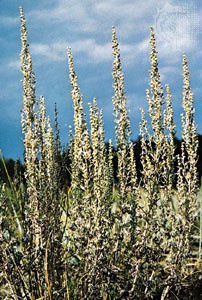absinthe
alcoholic beverage
 flavoured, distilled liquor, yellowish green in colour, turning to cloudy, opalescent white when mixed with water. Highly aromatic, this liqueur is dry and somewhat bitter in taste. Absinthe is made from a spirit high in alcohol, such as brandy, and marketed with alcoholic content of 68 percent by volume. wormwood (Artemisia absinthium; see photograph-->
flavoured, distilled liquor, yellowish green in colour, turning to cloudy, opalescent white when mixed with water. Highly aromatic, this liqueur is dry and somewhat bitter in taste. Absinthe is made from a spirit high in alcohol, such as brandy, and marketed with alcoholic content of 68 percent by volume. wormwood (Artemisia absinthium; see photograph--> ) is the chief flavouring ingredient; other aromatic ingredients include licorice (which usually predominates in the aroma), hyssop, fennel, angelica root, aniseed, and star aniseed. The beverage was first produced commercially in 1797 by Henry-Louis Pernod, who purchased the formula from a French exile living in Switzerland.
) is the chief flavouring ingredient; other aromatic ingredients include licorice (which usually predominates in the aroma), hyssop, fennel, angelica root, aniseed, and star aniseed. The beverage was first produced commercially in 1797 by Henry-Louis Pernod, who purchased the formula from a French exile living in Switzerland.Absinthe came to be considered dangerous to health because it appeared to cause convulsions, hallucinations, mental deterioration, and psychoses. These symptoms are evidently caused by thujone, a toxic chemical present in wormwood. Absinthe manufacture was prohibited in Switzerland in 1908, in France in 1915, and eventually in many other countries. In 1918 Pernod Fils established a factory in Tarragona, Spain, to manufacture both absinthe and a similar beverage, without wormwood, for export to those countries prohibiting true absinthe. Beverages developed as substitutes, similar in taste but lower in alcohol content and without wormwood, are known by such names as Pernod, anis (or anisette), pastis, ouzo, or raki.
Absinthe is usually served diluted with water and ice and may be used to flavour mixed drinks. The classic absinthe drink, the absinthe drip, is served in a special drip glass, allowing water to slowly drip through a sugar cube into the liquor. Pastis also turns cloudy white when mixed with water, and anis turns to a cloudy, greenish-tinged white.
- Nahant
- Nahariyya
- nahcolite
- Nahienaena
- Nahua
- Nahuan languages
- Nahuatl language
- Nahuel Huapí, Lake
- Nahuel Huapí National Park
- Nahum, Book of
- Nahum Goldmann
- Nahum Sokolow
- Nahum Tate
- Nahyān, Sheikh Shakhbūṭ ibn Sulṭān Āl
- Nahyān, Sheikh Zāyid ibn Sulṭān Āl
- Nahāvand, Battle of
- Naiad
- naiad
- Naidu, Sarojini
- nail
- nailhead
- nail-patella syndrome
- Naima, Mustafa
- Naim Suleymanoglu
- Nainital